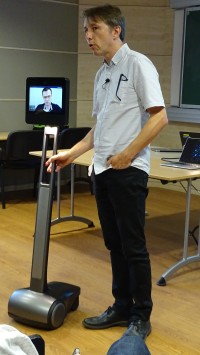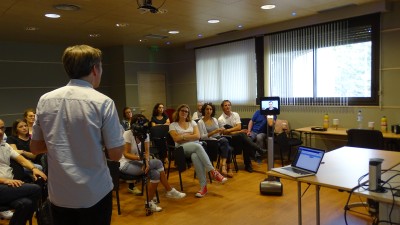Telepresence robots for inclusionDeployed at UPPA for students with disabilities
The principle is simple. The disabled student, from his place of care or his home, can connect to the remote robot, positioned in the classrooms. He can thus recover the social link, but also exchange with the teacher, his peers, and move in distant places. He therefore attends lessons in a way that is very similar to a physical presence.
Educational innovation: a robot for teaching
A telepresence robot can be seen, in first experimentation, as a video-conferencing system installed on a mobile base. The first robots appeared a few years ago in large American companies for remote collaborative work, with the possibility of moving from one office to another autonomously.
Very quickly, the use of robots by students with disabilities developed, allowing a real inclusion of these students in the classroom, despite their distance and isolation. It is also possible to use the robot for a distant teacher, for example to allow renowned speakers to intervene at a distance and to carry out excellent teaching. Finally, the use of this robot has also become more widespread in the medical field, particularly in telemedicine.
Robots deployed in educational institutions at national level
In France, the Auvergne-Rhône-Alpes region supported an initial experiment for pupils who are prevented from attending high schools from 2014 to 2016. This project demonstrated the importance of the tool in recovering social links. For their centenary, in 2015, the PEP de France reported the results of their experiments in several departments, including the Landes (in partnership with the UPPA). The number of initiatives has been growing ever since.
In our region, seven robots are used by SAPAD40. Ten robots are deployed at the UPPA (in partnership with the New Aquitaine Region) for students with disabilities, thus ensuring continuity between secondary and higher education in our region. The INSPE of Aquitaine is also acquiring eight robots to train future teachers in these new tools. Finally, a large-scale plan for the deployment of several hundred robots is currently being studied by the Ministry, based in part on the experience of the UPPA and SAPAD40 in this area.
A project with issues in scientific research
LIUPPA is involved in several research or teaching projects on the subject: PIA2 E-FRAN Persévérons, ANR NCU SPACE, PIA3 TIP ACCES. All these projects show the effectiveness of this solution for the recovery of social links. But the question of learning and evaluation remains. In particular, the reduced possibilities of interaction with the space in which the robot is located can be prohibitive, especially for practical lessons.
LIUPPA is experimenting with the addition of a connected environment to the robot (a set of connected objects allowing to act/gather information in the remote space), to allow the student to have more "power" and to get closer to a physical presence, thus reducing the transactional distance between him/her and the teacher (the learning).
The aim is to improve the tool so that it can be used more intensively (in numbers and over time), and in other contexts, including lifelong learning.

